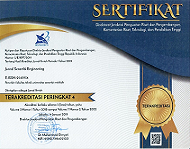Biocoagulant Utilization from Java Tamarind Seed and Sweet Orange Peel for Turbidity, COD and BOD reduction in Domestic Wastewater
Keywords:
biocoagulant, domestic wastewater, turbidity, COD, BODAbstract
Domestic liquid waste typically originates from home trash and requires treatment to decrease quantities of Biological Oxygen Demand (BOD), Chemical Oxygen Demand (COD), Total Suspended Solid (TSS), and mixed particles. Additionally, treatment is necessary to eliminate nutrients and harmful components. The objective of this study is to determine the optimal dosage of biocoagulant needed for the process of coagulation and flocculation in a laboratory setting using the jar test method, specifically for treating domestic wastewater. Tamarind seed shell waste contains tannin, which can act as a natural coagulant. It functions as a positively charged natural polyelectrolyte that efficiently binds to negatively charged colloidal particles. The study included independent variables consisting of different doses of a mixture between tamarind seed shell and sweet orange peel bio coagulants, with ratios of 1:0, 1:0.5, and 1:1. An optimal dosage of 1.5 grams of tamarind seed shell effectively reduced turbidity by 51%, BOD levels by 80%, and COD levels by 77%.












